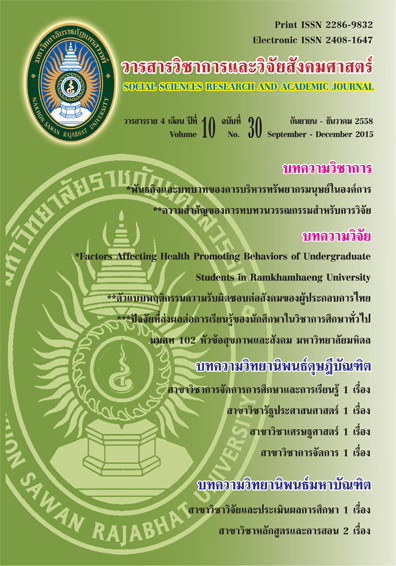ตัวแบบพฤติกรรมความรับผิดชอบต่อสังคมของผู้ประกอบการไทย; The Model of Social Responsibility Behavior of Thai Entrepreneur
Main Article Content
Abstract
บทคัดย่อ
การวิจัยนี้มีจุดมุ่งหมายเพื่อศึกษาตัวแบบของพฤติกรรมความรับผิดชอบต่อสังคมของผู้ประกอบการไทย และศึกษาปัจจัยเชิงเหตุและผลของพฤติกรรมความรับผิดชอบต่อสังคมของผู้ประกอบการไทย โดยใช้การศึกษาเชิงปริมาณในรูปแบบของโมเดลสมการโครงสร้าง และใช้วิธีการสัมภาษณ์เชิงลึกเพื่อสร้างตัวบ่งชี้ กลุ่มตัวอย่างคือผู้ประกอบการที่จดทะเบียนนิติบุคคล จำนวน 270 ราย รูปแบบความสัมพันธ์เชิงสาเหตุที่พัฒนาขึ้นประกอบด้วยตัวแปรแฝง 6 ตัว ตัวแปรประจักษ์ 22 ตัว วิเคราะห์ข้อมูลด้วยโปรแกรมสำเร็จรูปทางสถิติสำหรับสังคมศาสตร์
ผลการวิจัยพบว่าตัวแบบพฤติกรรมความรับผิดชอบต่อสังคมของผู้ประกอบการไทยที่พัฒนาขึ้น
มีความสอดคล้องกับข้อมูลเชิงประจักษ์ตามรูปแบบทฤษฎีปฎิสัมพันธ์นิยม และทฤษฎีต้นไม้จริยธรรม โดยพฤติกรรมความรับผิดชอบต่อสังคมขึ้นอยู่กับจิตลักษณะเดิมหรือลักษณะภายในตน (ด้านการมุ่งอนาคตควบคุมตน) มากที่สุด และยังส่งผ่านจิตลักษณะตามสถานการณ์ (ด้านทัศนคติที่ดีต่อความรับผิดชอบต่อสังคม) รองลงมาคือสถานการณ์ปัจจุบัน หรือสภาพแวดล้อมภายนอก (ด้านแบบอย่างที่ดีด้านความรับผิดชอบต่อสังคม) มีอิทธิพลทางตรงต่อพฤติกรรมความรับผิดชอบต่อสังคม และยังส่งผ่านจิตลักษณะตามสถานการณ์ (ด้านทัศนคติที่ดี ต่อความรับผิดชอบต่อสังคม) เช่นกัน
Abstract
This research aims to study the behavior model of the social responsibility of Thai entrepreneurs and to study the causal factors of social responsibility behavior of Thai entrepreneurs by using quantitative studies in the form of structural equation model and using in-depth interviews to create an index. The sample group consisted of 270 entrepreneurs who registered as juristic persons. The causal relationship model consisted of six latent variables and twenty two observed variables. The data were analyzed by Statistical Package for Social Sciences.
The results of this research revealed that the developed behavior model of the social responsibility of Thai entrepreneurs is consistent with empirical data according to interactionism model and ethical trees theory in that social responsibility behavior depends on the psychological characteristics or features within them the most (The future orientation and self-control). Moreover, it was passed through the psychological states (The attitude toward social responsibility) followed by the situational factors (A good example of corporate social responsibility). In addition, it has a direct influence on the behavior of corporate social responsibility and sends psychological states as well
(The attitude in social responsibility).


